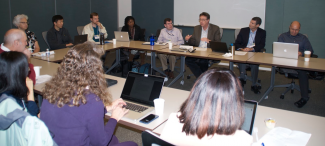The “Building a Weather-Ready Nation by Transitioning Academic Research to NOAA Operations” Workshop was held at the NOAA Center for Weather and Climate Prediction in College Park, Maryland, on November 1-2, 2017. NOAA and UCAR organized the meeting that drew more than one hundred participants from universities, government laboratories, operational centers, and the private sector. Members of the organizing committee included Reza Khanbilvardi, City College of New York, Chandra Kondragunta, NOAA/OAR, Jennifer Mahoney, NOAA/ESRL, Fred Toepfer, NOAA/NWS, and Hendrik Tolman, NOAA/NWS. John Cortinas, NOAA/OAR, and Bill Kuo, UCAR, served as Co-Chairs. A draft of the Workshop Report is available here.
The workshop was designed to inform the academic community about NOAA’s transition policies and processes and to encourage the academic community to actively participate in transitioning research to improve NOAA’s weather operations. It was also an opportunity to strengthen engagement between the research and operational communities.
The first day of the workshop consisted of a series of invited presentations on the policies, needs, requirements, gaps, successes, and challenges of NOAA transitions. During the second day, working groups discussed issues and made recommendations to improve the process of transitioning Research to Operations (R2O). In particular, the discussions led to several interesting suggestions on the participation of academic community in the NOAA R2O activities:
-
NOAA needs to recognize the academic community has a different rewards system from that of an operational organization. Scientific publication is critical for the career advancement of university professors and students. Therefore, the academic community will be much more interested in research that can lead to publication.The availability of computing resources is critical for successful R2O in weather and climate modeling. Given the limited NOAA computing resources and the challenges of obtaining security clearance to use NOAA computing facilities, an alternative solution is needed. Making NOAA operational models and data, and computing resources available through the cloud is an attractive solution.
-
The academic community cannot work for free. Therefore, appropriate funding to support their participation in R2O is critical. Good examples include the Hurricane Forecast Improvement Project (HFIP), Next Generation Global Prediction System (NGGPS), and Joint Technology Transfer Initiative (JTTI) announcement of opportunities.
Through NOAA support, several students were invited to participate in the workshop. One Ph.D. student from the University of Maryland shared that her eyes were opened to real-life challenges and issues that are confronting our field, something she was not able to learn from her classes. Interacting with these enthusiastic next-generation scientists, who are not afraid to tackle the challenging problems in our field, was the most rewarding part of the workshop.
Many participants commented that the workshop was informative, stimulating and productive, as it allowed the academic community to have a direct dialogue with NOAA on research to operations transition issues. The participants agreed that it would be desirable to have such a workshop once every two years.
